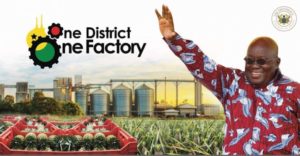1D1F policy needs to target services industry – IESS
 Member of the Institute of Environment and Sanitation Studies (IESS), Professor Chris Gorden, University of Ghana, Legon, said the One District One factory (1D1F) policy should be reviewed to include the service industry.
Member of the Institute of Environment and Sanitation Studies (IESS), Professor Chris Gorden, University of Ghana, Legon, said the One District One factory (1D1F) policy should be reviewed to include the service industry.
He said: “Ghana’s greatest asset is not just her natural resources, it is in the minds, innovative, and industriousness of the people, and if they can harness that for good purposes, nothing can stop the country from achieving its developmental goals”.
He said the top four global companies including Google and Amazon, none of them produce anything.
“What they produce is knowledge. It is knowledge that they generate, the information that emerges that makes them so rich,” he said.
Prof Gordon, who is also the Country Lead for Engagement for the Climatic Knowledge Developing Network, said this on the sideline of a second technical workshop on “Development Strategy for Urban Sustainability in Africa on the basis of SDGs Inter linkage Analysis (USiA)” in Accra.
The USiA is a policy research and based on the inter linkages analyses such as synergy and trade-off across the sustainable development goals. It seeks to propose policy recommendations on international cooperation, investments and solution prioritization in order to implement SDG’s 9 and 11
He said, the 1D1F could include a factory producing applications from mobile smart phones, adding that, it should not always have to be taking something from the grounds, either plants or minerals and change them into something else that makes a factory.
“We need to think broader than just something that consumes energy and you have physical product out because the people who are doing the most and advancing fastest are now in the service industry and now in the business of gathering data and knowledge and transferring it in such a way that is valuable to other people.
“To me the 1D1F policy is not ambitious enough. At least you should be thinking about ten districts for one factory minimum,” he said.
Currently the project is examining three specific sustainable challenges in the context of Ghana, Malawi and South Africa and seeks to propose policy recommendations on international cooper at iron, investment and solution prioritization to implement United Nations SDG Goal 9 and Goal 11 in Sub-Saharan Africa.
The two-day workshop is being funded by the Japanese International Cooperation (JICA) and the IESS is the host of the Ghana project.
The first USiA workshop, which was held in Ghana in August 2018, identified 20 potential solutions to the country’s developmental challenges.
These were further reviewed and put under three top solutions- Gender inclusiveness, Investment in basic and economic infrastructure and promotion of modernised and sustainable agriculture system.
The second workshop would revisit these three solutions identified, refine it further to see if there is an added innovation that was missing; disseminate the original solution to broader stakeholders for feedback and validation.
Source: GNA
